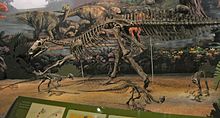Iguanodontia
| Iguanodontia | |
|---|---|

| |
| Tenontosaurus, Museu de História Natural Sam Noble Oklahoma | |
| Classificação científica | |
| Domínio: | Eukaryota |
| Reino: | Animalia |
| Filo: | Chordata |
| Clado: | Dinosauria |
| Clado: | †Ornithischia |
| Clado: | †Neornithischia |
| Clado: | †Ornithopoda |
| Clado: | †Iguanodontia Baur, 1891 |
| Subgrupos | |
| |
Iguanodontia é um clado de dinossauros ornitópodes.
Classificação
Iguanodontia foi proposta originalmente em 1891 por Georg Baur como uma infraordem de Archosauria.[1] Posteriormente, foi sinonimizada subjetivamente por W. D. Matthew em 1915 com Ornithopoda.[2] Em 1986, Paul Sereno resgatou o termo e o reintroduziu como uma infraordem de Ornithopoda.[3], porém, mais tarde em 1997, redefiniu por meio de filogenia como um clado de posição incerta, sendo o grupo mais inclusivo contendo Parasaurolophus walkeri, mas não Hypsilophodon foxii.[4]
Em 2021, Iguanodontia recebeu uma definição formal sob o PhyloCode: "O menor clado contendo Dryosaurus altus, Iguanodon bernissartensis, Rhabdodon priscus e Tenontosaurus tilletti, desde que não inclua Hypsilophodon foxii." Sob esta definição revisada, Iguanodontia é limitado às suas espécies tradicionalmente incluídas, e se fosse considerado que incluía hipsilofodontes, que não eram tradicionalmente considerados iguanodontianos, se tornaria um agrupamento inválido.[5]
abaxio segue um cladograma segundo Butler et al, 2011.[6]
| Iguanodontia |
| ||||||||||||||||||||||||||||||||||||
O cladograma mais recente abaixo segue uma análise de 2024 por Fonseca et al. posicionando Iguanodontia em Ornithopoda.[7]
| Pyrodontia |
| ||||||||||||||||||||||||||||||||||||||||||||||||||||||||||||||||||||||||||||||||||||||||||
Referências
- ↑ G. Baur. 1891. "Remarks on the reptiles generally called Dinosauria". The American Naturalist (em inglês) 25 (293): 434-454
- ↑ W. D. Matthew. 1915. Dinosaurs, with Special Reference to the American Museum Collections. American Museum of Natural History, New York 1-162
- ↑ P. C. Sereno. 1986. "Phylogeny of the bird-hipped dinosaurs (order Ornithischia)." National Geographic Research (em inglês) 2(2):234-256
- ↑ P. C. Sereno. 1997. "The origin and evolution of dinosaurs". Annual Review of Earth and Planetary Sciences (em inglês) 25: 435-489
- ↑ Madzia, D.; Arbour, V.M.; Boyd, C.A.; Farke, A.A.; Cruzado-Caballero, P.; Evans, D.C. (2021). «The phylogenetic nomenclature of ornithischian dinosaurs». PeerJ. 9: e12362. PMC 8667728
 . PMID 34966571. doi:10.7717/peerj.12362
. PMID 34966571. doi:10.7717/peerj.12362
- ↑ Richard J. Butler, Jin Liyong, Chen Jun, Pascal Godefroit (2011). «The postcranial osteology and phylogenetic position of the small ornithischian dinosaur Changchunsaurus parvus from the Quantou Formation (Cretaceous: Aptian–Cenomanian) of Jilin Province, north-eastern China». Palaeontology. 54 (3): 667–683. doi:10.1111/j.1475-4983.2011.01046.x
- ↑ Fonseca, A.O.; Reid, I.J.; Venner, A.; Duncan, R.J.; Garcia, M.S.; Müller, R.T. (2024). «A comprehensive phylogenetic analysis on early ornithischian evolution». Journal of Systematic Palaeontology. 22 (1). 2346577 páginas. doi:10.1080/14772019.2024.2346577


